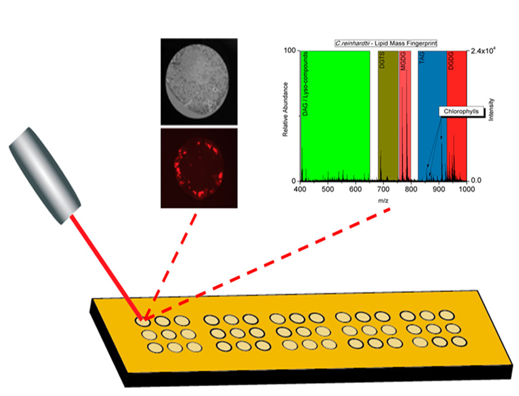Plasmonic Gold Microchips for Swift Microbial Identification with MALDI-MS
Background
Highly efficient ionization process is key to enhancing analytical performance for soft ionization techniques such as matrix-assisted laser desorption ionization (MALDI), especially when applying to single cell analysis. Because of the interference from matrix-related ions in low mass range, MALDI-MS is seldom applied to the analysis of low-molecular weight compounds. Additionally, lipidomics has recently emerged with immense unexplored potential in helping understand disease progression and effects. It is thus desirable and advantageous to have improved methods to detect low-molecular weight compounds using MALDI-MS.
Brief Description
Prof. Quan Cheng and colleagues from the University of California, Riverside have developed a gold microchip consisting of a nanoscale film fabricated on a gold substrate for highly effective, matrix-free laser desorption ionization mass spectrometry (LDI-MS) analysis of lipids. This technology allows for effective analysis of low mass metabolites without the need for time consuming extraction methods. The microchip also enhances fluorescent signal through metal enhanced fluorescence (MEF) allowing single cells to be located easily and improves ionization of lipids.
Fig 1: Gold microchips enable localization of cells with MEF and efficient ionization of lipid species. The lipid fingerprint can then be used to trace changes caused by toxicants or identify microbial species present.
Applications
- For use as a microchip in important research fields such as toxicology studies and microbial fingerprinting
- For use in bacterial detection and food analysis through lipid fingerprints
- Microchip platform for studying lipids relation to disease progression and effects
Patent Status
| Country | Type | Number | Dated | Case |
| United States Of America | Issued Patent | 9,671,409 | 06/06/2017 | 2010-561 |
Related Materials
Contact
- Grace Yee
- grace.yee@ucr.edu
- tel: View Phone Number.
Other Information
Keywords
microchip, LDI-MS, bacterial identification, lipid analysis, laser desorption ionization mass spectrometry, food safety
